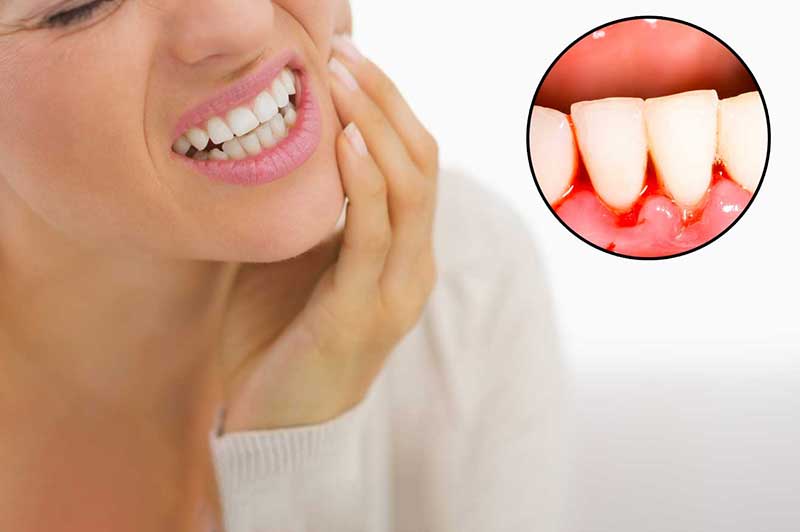
Bleeding Gums: Causes, Treatments, and Why Early Intervention Matters
Posted June 28, 2024 by Dr. Mini JoseWe brush our teeth daily, often without much thought. It's a routine activity, something we do almost mechanically. But how often do we really pay attention to what’s happening inside our mouths? A slight tint of blood in the saliva, often dismissed as nothing serious, can be the first sign of bleeding gums. Ignoring this early warning can lead to serious dental problems down the road. However, understanding the importance of early intervention can empower you to take control of your oral health. If this information has sparked your interest, read on to understand more about bleeding gums and how it can be prevented.
Understanding Bleeding Gums
Bleeding gums are a common issue that many people experience at some point in their lives. While it can be alarming, it is often a sign that something is not quite right with your oral health. Bleeding gums can be caused by a variety of factors, ranging from minor irritations to severe health conditions. Understanding the underlying causes is the first step towards effective treatment and prevention.
Types of Bleeding Gums: Normal vs. Abnormal
Bleeding gums can be categorised into two main types: normal and abnormal.
Normal Bleeding Gums: This type is usually a result of temporary irritation, such as brushing too hard or using a new toothbrush. Minor bleeding that stops quickly and doesn't recur is generally not a cause for concern. For instance, if you notice a small amount of blood when you floss after a long period of not flossing, this is usually due to the gums being unaccustomed to the activity. Once your gums get used to regular flossing, the bleeding should stop.
Abnormal Bleeding Gums: Persistent bleeding is a sign of an underlying issue that needs attention. This can be due to gum disease, vitamin deficiencies, or more serious conditions like blood disorders. Abnormal bleeding is a red flag that should not be ignored, as it can indicate more severe health problems such as gingivitis or periodontitis.
Bleeding Gums Across Different Age Groups
Adolescents
Hormonal changes during adolescence can cause gum sensitivity and bleeding. During puberty, the increased levels of hormones like progesterone and estrogen can improve blood circulation to the gums, making them more susceptible to irritation and bleeding. Proper dental care, including regular brushing and flossing, can control these symptoms. It's crucial for teenagers to maintain good oral hygiene practices and visit their dentist regularly to ensure their gums remain healthy.
Adults
In adulthood, improper dental hygiene is the leading cause of bleeding gums. Plaque buildup along the gum line can lead to inflammation and bleeding. Other factors include poor-quality dental work, improper fillings or crowns, and vitamin C deficiency. Additionally, lifestyle choices such as smoking can exacerbate gum problems. Adults must adhere to a consistent oral hygiene routine and seek professional dental care to prevent and treat gum disease.
Older Adults
Our gums naturally recede as we age, exposing more of the tooth and making them more prone to bleeding. Conditions such as diabetes, which is more common in older adults, can also contribute to gum issues. Medications that many older adults take can also affect oral health, leading to dry mouth and increased risk of gum disease.
Serious Conditions
Blood diseases and cancers like leukaemia can also manifest as bleeding gums. In such cases, a thorough diagnosis is crucial. Bleeding gums can be an early indicator of these serious conditions and should not be overlooked. Our meticulous diagnostic procedures at Chitra Multi Speciality Dental Clinic ensure that any underlying health issues are identified and addressed. We collaborate with specialist doctors to provide comprehensive care, ensuring our patients receive the best possible treatment.
The Slow Killer: Gum Disease
Gum disease is a slow, progressive condition that often goes unnoticed until significant damage has occurred. It's easy to overlook because the early symptoms, like bleeding gums, seem minor. However, untreated gum disease can lead to tooth loss and other severe health issues.
Gum disease starts with gingivitis, an inflammation of the gums caused by plaque buildup. The symptoms of gingivitis include red, swollen gums that bleed easily. If left untreated, gingivitis can progress to periodontitis, a more severe form of gum disease that can destroy the soft tissue and bone that support your teeth. This can eventually lead to tooth loss.
The progression from gingivitis to periodontitis can be slow, which is why gum disease is often referred to as a "silent killer." Many people don't realise they have gum disease until they experience significant symptoms such as loose teeth or receding gums.
Prevention and Treatment of Bleeding Gums
Preventing bleeding gums involves maintaining good oral hygiene practices. Here are some tips to keep your gums healthy:
- Brush Properly:Use a soft-bristled toothbrush and gentle, circular motions to clean your teeth.
- Floss Daily Flossing removes plaque and food particles between your teeth and the gum line. Make it a habit to floss at least once a day.
- Use Mouthwash: An antibacterial mouthwash can help reduce plaque and prevent gum disease.
- Regular Dental Visits:Schedule regular check-ups and cleanings with your dentist. Professional cleanings can remove plaque and tartar that regular brushing and flossing can't.
- Healthy Diet Eat a balanced diet rich in vitamins and minerals, especially vitamin C, which is essential for gum health.
- Quit Smoking: Smoking is a significant risk factor for gum disease. Quitting smoking can significantly improve your oral health.
Expert Care at Chitra Multi Speciality Dental Clinic
Dr. Mini Jose brings years of expertise to Chitra Dental Clinic. Her extensive experience includes working with renowned dentists, teaching as a college professor, and successfully running her own clinics.
We take a holistic approach to dental care at Chitra Dental Clinic, which has centres in Pattom and Sreekariyam in Trivandrum. Our USPs are personalised treatment plans, advanced techniques, and state-of-the-art equipment. We believe in treating the whole person, not just the symptoms.
Our team works closely with each patient to develop a customised treatment plan that addresses their unique needs and concerns. Whether you need a routine cleaning, advanced periodontal treatment, or specialised care for a more severe condition, we are here to help.
Conclusion: The Best Tooth is Your Own
Your natural teeth are invaluable, and they deserve the best care. Pay attention to the early signs of gum disease. Regular visits to Chitra Multi Speciality Dental Clinic can help you maintain a healthy smile for life. Our clinics in Pattom and Sreekariyam are staffed by dedicated professionals committed to your dental health.
By taking proactive steps to maintain your oral health, you can prevent gum disease and ensure your smile stays healthy and beautiful for years to come. Visit Chitra Multi Speciality Dental Clinic for comprehensive dental care and expert advice on keeping your gums healthy. Remember, the best tooth is your own, so give it the care it deserves at all times.



